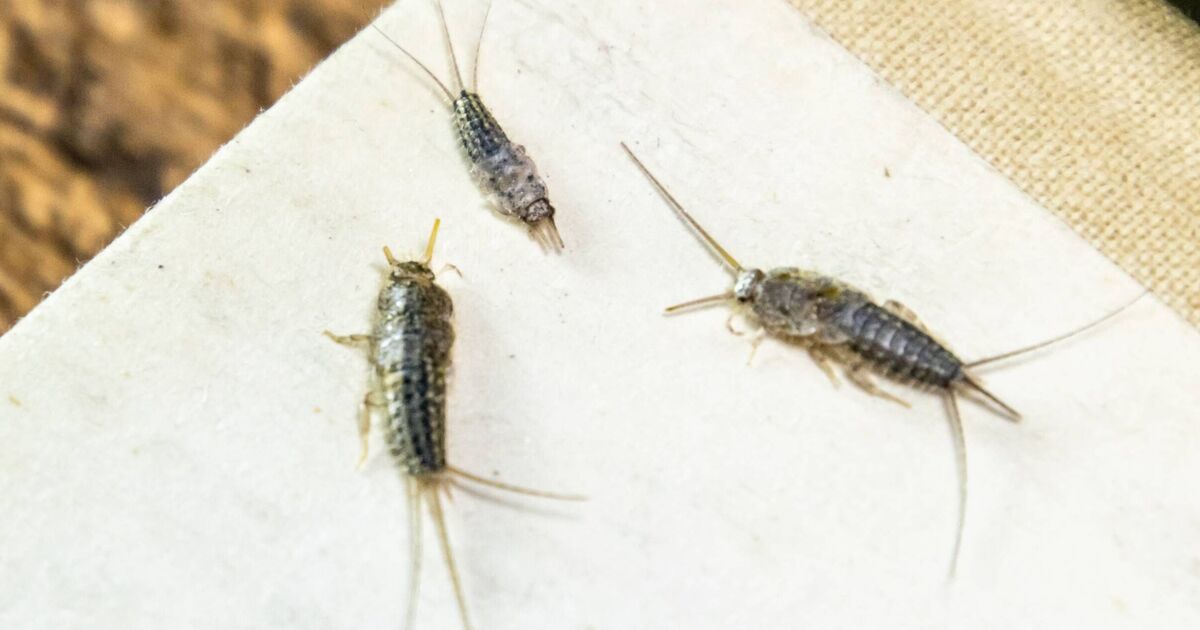UK residents are being urged to be on the lookout for a particular insect that could infest their homes this season. Experts have warned that households may face an invasion of silverfish as the weather turns colder.
Bathroom specialists at SteamShowerStore.co.uk have offered advice on how to rid your home of these irritating pests permanently and explained why they are more common during the colder months. Although silverfish can be found in homes all year round, they particularly thrive in areas with high humidity.
As winter draws near and heating systems are switched on, many people will notice an increase in humidity levels. This creates an ideal environment for silverfish, which tend to gather in damp areas and can leave behind yellow stains as evidence of their presence.
Other signs of a silverfish infestation include shed skin, tiny black droppings, and damage to furniture and carpets, as these insects feed on almost anything containing starch. Experts suggest using a dehumidifier and introducing lavender scents as effective ways to help eradicate these pests.
While these insects are generally considered a nuisance, they won’t harm you, but they can ruin your food. Silverfish are known to leave droppings in your food, so checking for any signs of these pests is crucial.
If you spot any bugs, make sure to discard the affected items. While silverfish don’t pose a threat to your health and won’t bite, they can wreak havoc in your home.
As chewing insects, they’re capable of gnawing through belongings, and their droppings can result in unsightly stains. Silverfish have a preference for dark spaces, often hiding during daylight hours and avoiding bright sunlight. When disturbed, they quickly dart away to find another secluded, dim area to hide.
Bathroom expert Andy Ellis from SteamShowerStore.co.uk points out that these silver-scaled nuisances are particularly troublesome in bathrooms. “While they’re generally harmless, the critters don’t just appear once and never again, they like to come and go the moment they sniff out any dampness in a home,” he explained.
“They also favour coming in houses during winter. Many homes will have higher humidity levels from the heating being turned on and the cold from outside causing condensation on the windows.
“To help deal with the problem, we strongly advise tackling humidity by fixing vents and investing in dehumidifiers. It’s also worth hanging up the bathroom mats after every shower to prevent their appearance.”
How to get rid of silverfish:
1. Fix the vents: Silverfish are attracted to areas with high humidity, so it’s crucial to ensure all vents are in good repair to reduce their likelihood of appearing. Properly working vents can help control bathroom condensation, which often results in increased humidity levels.
2. Use bleach and boiling water in sinks: It’s not unusual to find silverfish in your bathroom and kitchen sinks as they tend to climb up the pipes looking for damp spots. To discourage them, clean the sink with bleach and follow up with hot water.
3. Air out bathroom mats: Occasionally, hang bathroom mats to let them air out. Leaving them on the floor can create a moist environment that attracts silverfish.
4. Consider a dehumidifier: A dehumidifier is an excellent way to decrease moisture in the air. For optimal results, position it in areas prone to humidity like bathrooms and kitchens.
5. Use lavender oil: To keep silverfish away, apply some lavender oil to cotton pads and dab them around the sink, shower drain, and toilet. These pests don’t like the smell and will avoid treated areas.
6. Clean up hiding places: Silverfish often hide in dark corners and behind radiators where damp towels are kept. Regular cleaning of these areas is vital for early detection of any problems. Keep an eye out for yellow stains, which could signal their presence.
7. Seek professional help: If your efforts to eradicate silverfish prove fruitless, it’s crucial to reach out to professionals. A plumbing leak could be causing dampness under your home.
Female silverfish continuously lay eggs once they become adults. They typically deposit their eggs in the tiny gaps and fissures found throughout your home, and these eggs usually hatch within three weeks.
The young silverfish mature into adults in about four to six weeks. The young silverfish resemble their adult counterparts, just in a smaller and lighter form. These insects have a surprisingly long lifespan, ranging from two to eight years.
They can also go for extended periods without food, sometimes lasting up to a year. However, they are quite sensitive to moisture and thrive in high humidity environments.
Checkout latest world news below links :
World News || Latest News || U.S. News
The post Brits urged to watch out as ‘silverfish infestations expected’ appeared first on WorldNewsEra.

